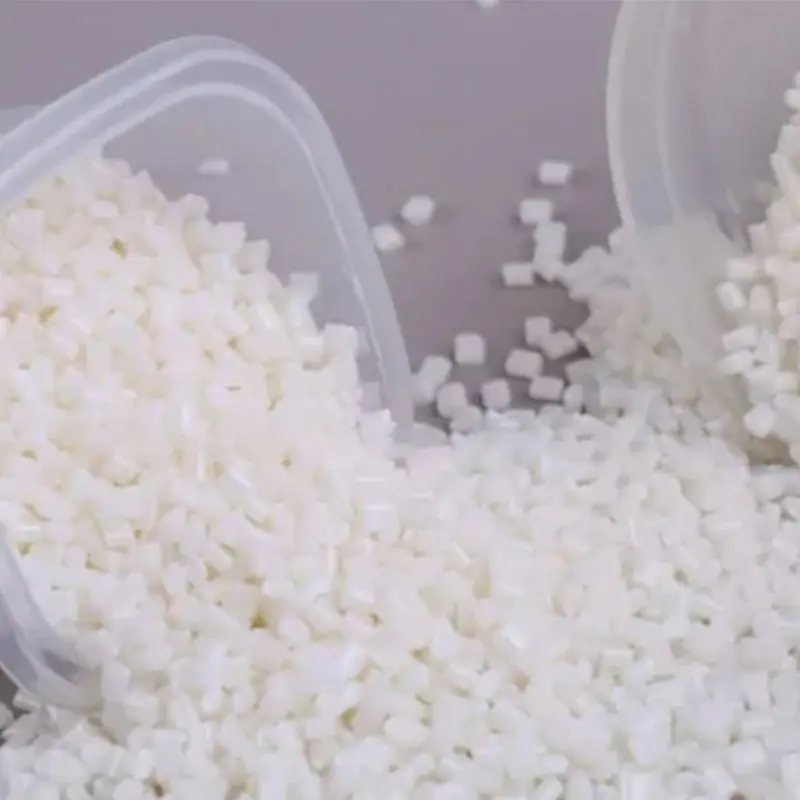Applications of Oil Bottle Grade Pet Chips Resin
2024-07-25
Oil bottle grade PET (polyethylene terephthalate) chips resin is a type of plastic material specifically designed for manufacturing bottles that contain edible oils and other liquids. This grade of PET resin offers particular properties that make it suitable for food contact applications and provide the necessary strength, clarity, and barrier properties required for oil packaging. Here’s a comprehensive overview:
Properties
1. High Clarity and Transparency:
- Provides excellent clarity, allowing consumers to see the product inside, which is particularly important for oils.
2. Strength and Durability:
- Offers high mechanical strength to withstand the stresses of handling, transportation, and storage.
3. Barrier Properties:
- Possesses good barrier properties against gases and moisture, helping to preserve the quality and extend the shelf life of the oil.
4. Chemical Resistance:
- Resistant to the chemicals found in oils, ensuring that the container does not degrade or interact with the contents.
5. Lightweight:
- PET bottles are lightweight, reducing shipping costs and making them easier to handle.
6. Recyclability:
- PET is highly recyclable, making it an environmentally friendly choice for packaging materials.
Applications
1. Edible Oil Bottles:
- Used for packaging various types of edible oils, including vegetable oil, olive oil, and cooking oil.
2. Other Liquid Containers:
- Suitable for packaging other food-grade liquids, such as vinegar, sauces, and beverages.
Advantages
1. Consumer Appeal:
- The high clarity and attractive appearance of PET bottles make them appealing to consumers.
2. Product Protection:
- Protects the oil from oxidation and contamination, maintaining its quality and taste.
3. Cost-Effective:
- Economical to produce and transport due to their lightweight and durable nature.
4. Safety:
- PET is shatterproof, unlike glass, reducing the risk of breakage and potential injury.
Production Process
1. Raw Material Preparation:
- PET chips are produced through the polymerization of terephthalic acid and ethylene glycol.
2. Injection Molding:
- PET chips are melted and injected into molds to form preforms, which are test tube-like pieces that will later be blown into bottles.
3. Blow Molding:
- The preforms are heated and blown into bottle shapes using high-pressure air in a blow molding machine.
4. Quality Control:
- The bottles undergo rigorous quality checks to ensure they meet the required specifications for clarity, strength, and safety.
Handling and Storage
1. Storage Conditions:
- Store PET chips in a cool, dry place to prevent contamination and degradation.
- Keep away from direct sunlight and moisture.
2. Handling Precautions:
- Handle with care to avoid contamination and ensure the quality of the PET resin is maintained.
Environmental Considerations
1. Recycling:
- PET bottles are recyclable and can be processed into new PET products, reducing environmental impact.
- Encourages a circular economy where materials are reused and recycled.
2. Sustainability:
- Many manufacturers are developing bio-based PET resins to further enhance sustainability.
Conclusion
Oil bottle grade PET chips resin is a versatile and essential material for the production of oil bottles and other liquid containers. Its properties of high clarity, strength, and chemical resistance make it ideal for food-grade applications, while its recyclability and lightweight nature offer significant environmental and economic benefits. Proper handling and storage are crucial to maintaining the quality of PET resin, ensuring that the final products meet industry standards and consumer expectations.



